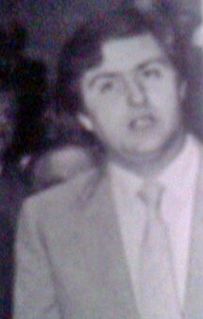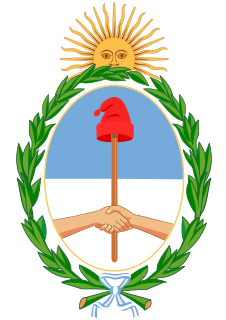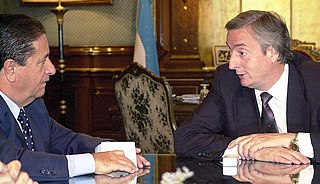Background
Amid sudden hyperinflation and riots, Governor Carlos Menem exhorted voters in May 1989 that "following me will not disappoint you!" Elected in a landslide, his administration had a rocky start marked by an early stabilization plan that had failed by December and a series of corruption scandals surrounding his freewheeling in-laws. After a tentative stability had been achieved by the end of 1990, a new currency crisis in January 1991 led President Menem to transfer his Foreign Minister, Domingo Cavallo, to the Economics Ministry. Cavallo, an unorthodox economist remembered for having rescinded the Central Bank's hated Circular 1050 and its crushing interest rate surcharges during a stint as Central Bank President in 1982, was entrusted to bring stability to Argentina's shredded currency, the austral, and to begin the repair of Argentina's nearly non-existent relations with its foreign creditors (owed arrears on billions of debt since 1988) and the country's own sizable upper class (who held well over US$50 billion in assets abroad). [3] [4]
The 1989 riots were a series of riots and related episodes of looting in stores and supermarkets in Argentina, during the last part of the presidency of Raúl Alfonsin, between May and June 1989. The riots were caused by the rampant hyperinflation and food shortage, and were associated with legal protests and demonstrations.

Carlos Saúl Menem Akil is an Argentine politician who was President of Argentina from July 8, 1989 to December 10, 1999. He has been a Senator for La Rioja Province since December 10, 2005.
A currency crisis is a situation in which serious doubt exists as to whether a country's central bank has sufficient foreign exchange reserves to maintain the country's fixed exchange rate. The crisis is often accompanied by a speculative attack in the foreign exchange market. A currency crisis results from chronic balance of payments deficits, and thus is also called a balance of payments crisis. Often such a crisis culminates in a devaluation of the currency.
Backed partly by a then-record US$8 billion trade surplus in 1990 and partly by the assumption that Menem's free-market policies would encourage a wave of foreign direct investment, Cavallo's Convertibility Plan tied the Argentine currency to the U.S. dollar, leading a sharp drop in local interest rates and to a recovery in local deposits, lending and the depressed economy soon after the plan's March 27, 1991 introduction. Currency stability led particularly to lower inflation, which fell from 1,350% in 1990 to 84% in 1991; prices rose 1.3% in the month of August (the best showing since 1974) and the hitherto unpopular Menem saw his approval soar. Menem's turn against time-honored Justicialist Party tenets such as the support of labor laws and the encouragement of State enterprises (policies defined in the 1940s by the party's very founder, Juan Perón), led some in his party to run on splinter Peronist tickets, which did well - but came far from seriously challenging the official party ticket. [5]
A foreign direct investment (FDI) is an investment in the form of a controlling ownership in a business in one country by an entity based in another country. It is thus distinguished from a foreign portfolio investment by a notion of direct control.

The Justicialist Party, or PJ, is a Peronist political party in Argentina, and the largest component of the Peronist movement.

Juan Domingo Perón was an Argentine Army general and politician. After serving in several government positions, including Minister of Labor and Vice President, he was elected President of Argentina three times, serving from June 1946 to September 1955, when he was overthrown in a coup d'état, and then from October 1973 until his death in July 1974.
Menem's contentious divorce from his wife of 25 years, Zulema Yoma, reports of massive corruption surrounding his in-laws and the resignation under indictment of his Public Works Minister and privatizations guru, Roberto Dromi, could not overshadow the improving economic climate among the electorate at large. The Justicialist Party's victory in the 1991 mid-term elections was not so much absolute as it was relative: the party made no inroads into their large majorities in the Argentine Chamber of Deputies or among the nation's governors; indeed, they lost 3 of their 17 governors elected in 1987. They did, however, increase their difference over the UCR, whose leader, former President Raúl Alfonsín, resigned amid scorn over the shadow his chaotic 1983-89 tenure seemed to cast over these polls. The UCR, in two upsets, wrested governorships in Catamarca and Chubut Provinces, however. The paramount Buenos Aires Province gave Vice-President Eduardo Duhalde a 2-to-1 victory over the UCR's gray eminence, former Economy Minister Juan Carlos Pugliese; in the Greater Buenos Aires area, on the other hand, one-time mutineer Col. Aldo Rico was able to translate voters' anger in the over rising illegal immigration and crime rates into an unexpected 3 seats in Congress for his far-right MODIN. These elections helped consolidate the scandal-plagued Menem's tenuous grasp on the presidency, making them (in his words) "the day Menemism was born." [4] [6]

Zulema Fátima Yoma was the First Lady of Argentina from 1989 to 1991, when she divorced Ex-President Carlos Menem.
Privatization can mean different things including moving something from the public sector into the private sector. It is also sometimes used as a synonym for deregulation when a heavily regulated private company or industry becomes less regulated. Government functions and services may also be privatized; in this case, private entities are tasked with the implementation of government programs or performance of government services that had previously been the purview of state-run agencies. Some examples include revenue collection, law enforcement, and prison management.

The Chamber of Deputies is the lower house of the Argentine National Congress. It is made up of 257 national deputies who are elected in multi-member constituencies corresponding with the territories of the 23 provinces of Argentina by party list proportional representation. Elections to the Chamber are held every two years; half of its members are renewed each election.














